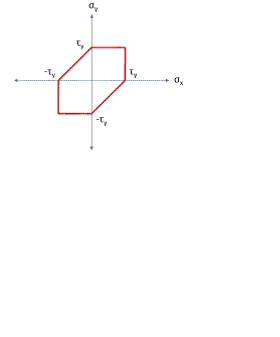There are a set of criterion on the basis of which we can predict the failure load/loads require for a certain component. It is comparatively easy to compute failure stress if the component under your design consideration is subjected to single force then multi directional multiple forces. Take help from the proven criterion for designing especially for the second case.
Ductile materials normally fails (yielding starts) due to the slippage of crystal planes along the plane of maximum shear stress. Means ductile materials normally fails due to shear rather than tension/compression. Why? Because for ductile materials yield strength in shear is approximately half than the yield strength in tension or compression.
What this theory says?
If maximum shear stress developed in any component exceeds the maximum shear yield strength of that material, then it will fail.
Let’s go to some basic equations, for 2D stress condition maximum shear stress developed in a component is:
τmax = ½(σx – σy )
So, as per the maximum shear stress theory, the component will withstand the external force (means will not fail) if
½(σx – σy )<= sys where, sys=yield strength in shear. ———————- Eqn. 1
Now, for ductile material,
Yield strength in shear (sys) =0.577 x principle yield strength (sy)
i.e., sys ≈ ½ x sy
i.e., sy ≈ 2 sys
So, we can write Eqn.1 as:
(σx – σy )<= 2sys
i.e., (σx – σy )<= sy
Hence, in order to satisfy the maximum shear stress theory the individual principle stresses as well as the difference between the two principle stresses should be less than or equal to the principle yield strength of the material,
| σx |<= sy , | σy |<= sy and | σx – σy |<= sy
In order to satisfy the maximum shear stress theory the principle stresses need to be within the polygon.

Hi, I am Shibashis, a blogger by passion and an engineer by profession. I have written most of the articles for mechGuru.com. For more than a decades i am closely associated with the engineering design/manufacturing simulation technologies. I am a self taught code hobbyist, presently in love with Python (Open CV / ML / Data Science /AWS -3000+ lines, 400+ hrs. )
